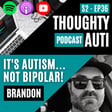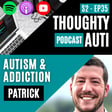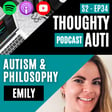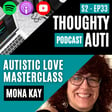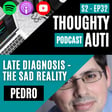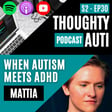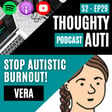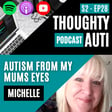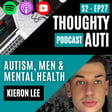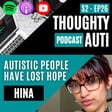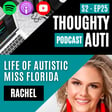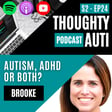
Late Diagnosis Of Autism with Purple Ella
What STOPS people getting a diagnosis? What positives or negatives can you expect?
Purple Ella is a renowned Autism, Disability and ADHD advocate with their hands in many pots; perhaps best known for their YouTube channel and social media... Ella seeks to shine a light on areas lacking in Autism awareness and holistic support!
In this episode of the Thoughty Auti Podcast, Thomas Henley talks to Ella about his experience of being diagnosed young, comparing and contrasting his experiences with Ella's experience of being diagnosed later in life.
Kicking off the conversation, they talk all about Ella's Autism Assistance Dog 'Coco' and some of the difficulties of access and social engagement that come with her. Ella informs us of their previous employment in performing arts at a circus group, and how that shaped their predilection for the online entertainment!
Post-diagnosis, Ella explains the process of looking back on their previous life experiences and realising moments where they attributed Autistic struggles to being "a bad human being". They also cover their experiences with pregnancy and their relationship with their husband, concluding with how much an Autism diagnosis made a positive impact on their collective lives.
The two talk about ways people can start Unmasking, re-writing your life narrative, accepting yourself, and processing trauma... in this AMAZING episode!
If you have an exciting or interesting story and want to appear on the next podcast, please contact me at: aspergersgrowth@gmail.com
Ella's Links:-
Website - https://www.purpleella.com/
YouTube - https://www.youtube.com/user/purplemumify
Instagram - https://www.instagram.com/purpleellaandcoco/
Song Of The Day (Listen Here) - https://open.spotify.com/playlist/5UDIyN5TSYN4zMcRoQPrG8?si=9255ed3480d840b5
▬▬▬▬▬▬▬▬▬▬▬▬▬▬▬▬▬▬▬▬▬▬▬▬▬▬▬▬▬▬▬
Website - https://www.thomashenley.co.uk
♫ THOUGHTY AUTI PODCAST Get it on Spotify free here - https://open.spotify.com/show/6vjXgCB7Q3FwtQ2YqPjnEV
FOLLOW ME On Social Media ♥ -
☼ Facebook - Aspergers Growth
☼ Twitter - @aspergersgrowth
☼ Instagram - @aspergersgrowth
Support via Patreon! - https://www.patreon.com/aspergersgrowth







